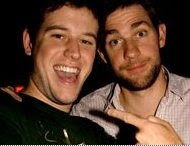 Waltz with Bashir
Waltz with BashirDirected by Ari Folman
90 min
Rated R
Review by Scott Johnson
HISTORY IS written by the winners. The victors always turn out to have fought a just war--in the textbooks they will go on to write--and any doubts or contradictory evidence is flushed down the Orwellian memory hole.
That is how it is supposed to work, but individuals tend to remember things differently, regardless of how hard they might want to forget.
This is the problem dealt with in Waltz with Bashir, a film about Israeli soldiers who fought in Lebanon in the early 1980s. Told as an "animated documentary"--a series of interviews with animated visuals, memories and dream sequences--the story revolves around director Ari Folman's effort to remember his experiences in Lebanon, every memory of which has been repressed.
Folman interviews several people who served with him and might be able to fill in the blanks. Each provides a unique story that both fills in some of the details Folman is looking for and documents a uniquely incredible experience that most would prefer to forget. Describing one of the men, Folman comments that before the war everybody thought he would be a Nobel Prize-nominated physicist by the time he was 40. "By the time I turned 20," the man says, recounting his now lost youth, "that future was gone."
The innovative imagery is a product of several forms of animation, creating the look of an animated graphic novel. This makes the various tales of Folman's fellow soldiers much more believable than watching them played out in live action. It also helps to create a fantastical atmosphere that conveys the sense of a half-forgotten memory. The haunting and poetic scenes capture the fear, loneliness and misery that the soldiers faced.
But this is not Akira Kurosawa's Rashomon, a movie in which the details of a rape and murder are described by multiple witnesses, with each story only contradicting the previous one. If only that were true, Folman might be able to avoid the painful truth. Rather, the deeper he digs, the closer Folman comes to an accurate account of the history he participated in.
For a moment, it seems like the worst things he will find are the challenges that the soldiers faced. But it turns out that Folman was at the Sabra and Shatila massacre in 1982, where Israeli soldiers stood guard while the Lebanese Phalangist militia massacred 2,000 innocent Palestinian civilians. Folman slowly comes to realize that he and his fellow soldiers--who stood by as the massacre took place--are complicit.
A reporter he interviews recounts calling then-Defense Minister (and later Prime Minister) Ariel Sharon, who seemed blissfully unconcerned--but fully informed--of the massacre that was occurring. Folman's worst fear seems to be coming true--that he is complicit in a genocidal brutality on par with what his parent faced in Auschwitz.
In another interview, a psychologist tells him that people tend to remember things that did not actually happen to them, taking stories and images they discover after the fact and rewriting their own memory. This is essentially what has happened with the collective memory of many Israelis, who believe that the Phalangists and not the Israelis were responsible--which Folman shows to be a gross simplification.
Folman and his cohorts talk about how they erected an emotional wall between themselves and the events around them at the time of the war. One even describes looking on the battle scenes as if he was looking at them through a camera--but eventually the "camera breaks" as he finds himself in the middle of a scene too gruesome to either comprehend or ignore.
The animation in Bashir plays the role of this "camera", allowing us to view the war at arms length. Ultimately, as he comes to comprehend his own involvement in the massacre, the "camera" of both the character and director Ari Folman will break as well, as the long repressed images of brutality come flooding back.
Waltz with Bashir is not specifically pro-Palestinian, nor is it overtly critical of the Zionist political project. But its purpose is to lay the responsibility on Israel for the Sabra and Shatila massacre, attempting to challenge the whitewashed memory of Israeli innocence. Therefore, it is a very welcome development that this film has found some success inside of the country. Considering Israel's current invasion of Gaza, the hope is that this film will have some resonance with a wide audience there.
One scene in particular that seems incredibly relevant in Bashir is when Israeli soldiers look down on the Sabra and Shatila refugee camps as the massacre is carried out and do nothing to stop it. In a strikingly similar scene, the Wall Street Journal recently reported on Israeli citizens gathering on steep hillsides overlooking Gaza for a view of the battles, turning war into a spectator sport.
Perhaps they might learn from Waltz with Bashir that there is nothing innocent about this sort of gleeful spectatorship.
Originally published at SocialistWorker.org





No comments:
Post a Comment